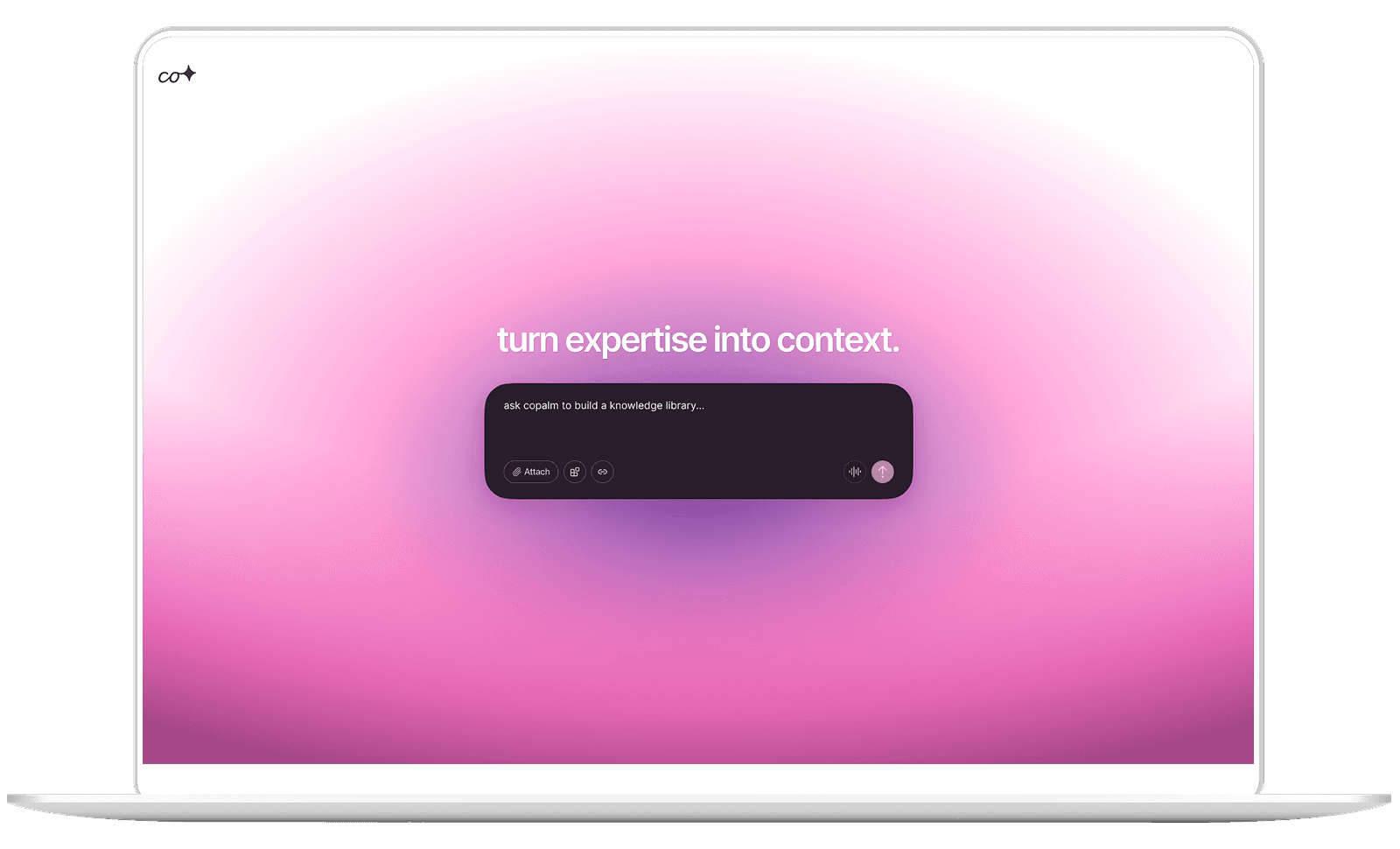Building an AI thought partner for expertise →
by collaborating with 23+ designers, simplifying content workflow using AI.

Jan 2025 - Present
my role — Product Designer + Researcher

TL;DR
copalm is an AI thought partner designed to enhance creative writing skills. it addresses challenges in content design, particularly integrating generative AI to foster critical thinking and active writing. copalm aims to empower instructional designers provide support in their creative process, from setting objectives and defining personas to writing and refining content. it prioritizes the designer's thinking, integrating AI at later stages for suggestions, ensuring human oversight and ethical considerations.
context
Problem
Generative AI in content design risks student disengagement, cognitive offloading, and weakened critical thinking in learning designer.
Outcome
So I designed copalm to foster autonomy, writing, and active thinking in self-paced education for learning designers.
Up to 70% of younger AI users experience cognitive offloading.
A projected 20–30% decline in reasoning skills due to AI in the next decade.
However, AI can boost thinking and creativity by 15–32%,
if used efficiently.
problem scope
Education Technology

Education UX & Learning Experience Design
AI in Education & Content Design
Human-AI Collaboration in Learning Design
Instructional Design Sandbox for Co-Creation
my brainchild
for context, student engagement is hard for instructional designers.
while it is hard, designer's reasoning abilities might to reduce with over use of AI
Pivot
from
How might Instructional Designers utilize Generative AI tools as creative sources to generate content for high school students in asynchronous environments?
to
How might Instructional Designers utilize Generative AI tools as creative sources to generate content while expanding critical thinking and creativity skills?
i chose instructional and content designers as users for this project
preliminary research
student engagement in online learning is a challenge, and current content design process may not address this. while AI offers solutions, it also affects independent thought process while interaction. the project examines how to leverage AI to support instructional designers in creating engaging content that fosters critical thinking in the design process.
on asynchronous learning
60% of high school students in asynchronous learning struggle with intrinsic motivation, often due to poor instructional design.
on instructional design
70% of students may disengage from content that doesn’t align with their preferences.
on critical thinking
70% of younger AI (both student & designers) users are experiencing cognitive offloading that leads to reduced critical thinking.
on co-writing
when AI is used as a cognitive partner, it can boost critical thinking and creativity by 15–32%, especially with intent and curiosity.
Need for Intentional Human-AI Collaboration
designer interviews
"The words are the things people are coming to the site for. They're not coming for the pictures, you know."
Interviewees emphasized the important of user needs, clarity, and emotional resonance in content. While AI aids, they warned against over-reliance, prioritizing human oversight, ethics, and delivering high-quality, trustworthy content to shape user experiences and achieve goals.
Content Systems
8 in UX Writing &
Content Strategy
2 in Content Leadership
4 in Education &
Learning Design
2 in AI Systems
thematic analysis
The interviews highlight several interconnected themes shaping the evolving role of content design. Content designers increasingly collaborate, prioritize user-centered content with empathy, and use design systems. While AI is a valuable tool, it's not a human replacement, requiring prompt engineering and careful navigation of quality, accuracy, and ethics. A need for AI collaboration was highlighted throughout research.
content design process and best practices
Voice and Tone
Design Systems
evolving role of content design
Collaboration is key
AI’s impact
navigating the challenges of AI in content creation
AI as a Tool, Not a Replacement
Prompt Engineering and Collaboration
Quality and Accuracy Concerns
Ethical Considerations
importance of user-centered content
Empathy
Emotional Connection
competitive analysis confirmed a gap in user needs
I chose to prioritize designer's thinking
Copalm's design aligns with how designers naturally create content, starting with critical thinking tasks like setting goals and defining learners. It then aids with writing and refinement, always keeping the designer in control. AI tools are integrated at later stages for suggestions, ensuring designers retain autonomy and use AI as a reflective partner, not an automated replacement.
thinking & creativity
add context
set objectives
choose format
imagine persona
high
medium
low
writing
content variation
formatting
genAI guides
genAI roles
presenting copalm

building for a brainstorm friendly environment for designers.
I am currently working towards building an optimized user journey for copalm so designers can work with multiple tools and easily integrate them in their workflow.
Last Update: 10.21.25
Made with iteration & feedback
© Sanskriti Bhatnagar 2025